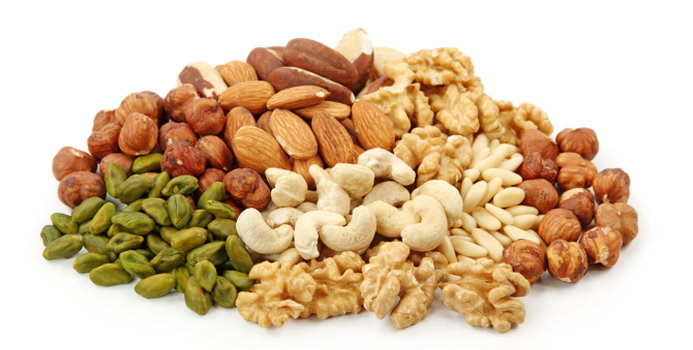For years, fats have been needlessly shunned from many diets, believing that calories from fat contribute to unhealthy weight gain. However, healthy fats are now considered a pillar of any balanced diet, with nuts paving the way into this new era.
Fats in Nuts
Besides being packed with protein, nuts are also an energy-dense source of various fats. While one ounce contains about 13-18g of fat, the fat in most nuts is primarily monounsaturated and polyunsaturated. Encouraged as part of a healthy diet, these fats have been linked to healthy cholesterol regulation as well as other health benefits. In addition, some nuts are a rich source of omega-3 fatty acids, known for their anti-inflammatory effects to aid in lowering the risk of blood pressure.
The fat profile of nuts will vary from one type to another, so including a variety of nuts in your diet will help to ensure that you have a good balance of healthy fats. For example, almonds, cashews, hazelnuts and pecans are higher in monounsaturated fat, whereas Brazil nuts, pine nuts and walnuts contain more polyunsaturated fats.
Nutritional Benefits of Nuts
Nuts provide anywhere from 1-7 grams of protein and 1-3 grams of fiber per ounce, making them an excellent hunger-suppressor and dietary addition. They also provide a wide range of essential nutrients, including several B vitamins, vitamin E and minerals such as calcium, iron, zinc, potassium and magnesium. Nuts also pack other heart-healthy phytochemicals such as flavonoids, resveratrol and plant sterols.
It's important to remember that although nuts are packed with healthy benefits, due to their higher fat content, they are also packed with calories. Just a small one ounce serving contains about 160-200 calories. Therefore, it's important to keep consumption within moderation. Incorporating moderate amounts of nuts into a healthy diet can be beneficial. However, too much of a good thing can derail weight loss attempts and overpower any nutritional benefits.
Tips for Adding in Nuts Sensibly
The trick to eating nuts without overdoing it is to measure out a one ounce serving size beforehand. Additionally, try eating them in place of other snacks, rather than in addition to them. That way, you get the benefits without adding excessive calories on top of your normal intake. If you opt for the sugar-coated, chocolate-dipped, dry-roasted or oil-roasted, be aware that these pack a higher fat, salt and caloric content, neglecting some of the nutritive benefits the natural nuts provide.
Overall, nuts are high in fiber, protein and contain many beneficial vitamins and minerals. In keeping an eye on portion size, nuts can be a convenient, tasty and nutritious part of any diet.
Sarah Dreifke is a freelance writer based in DeKalb, IL with a passion for nutrition education and the prevention of chronic disease. She holds a Bachelor of Science in both Dietetics and Life Sciences Communication from the University of Wisconsin-Madison. Currently, she is working towards a combined Master's Degree in Nutrition and Dietetics as well as a dietetic internship at Northern Illinois University.




